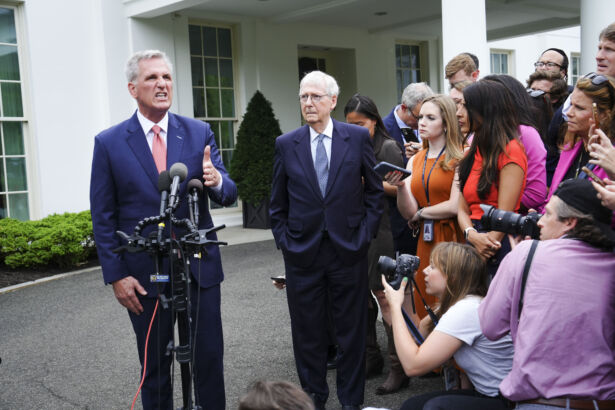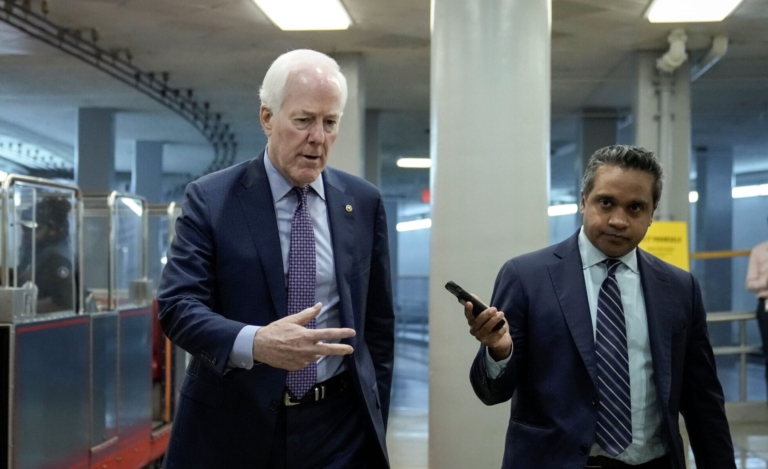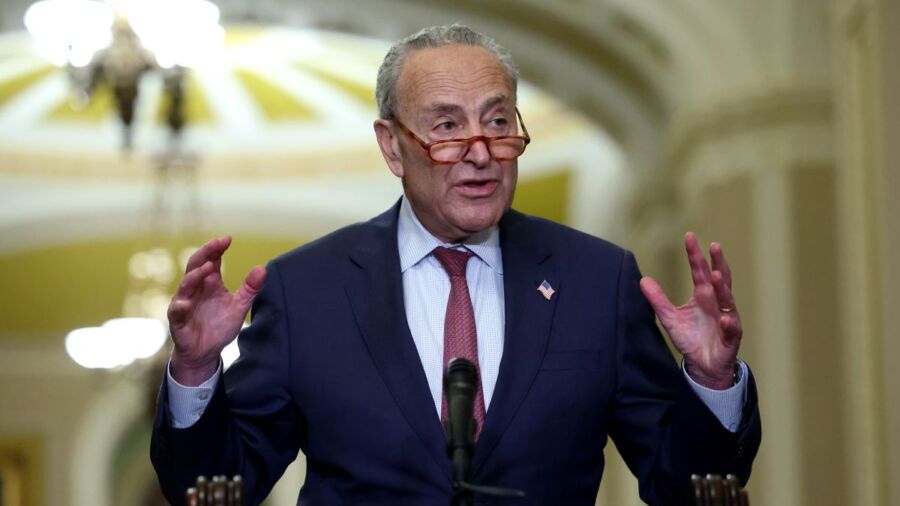The U.S. Senate on July 25 overwhelmingly adopted two amendments to the proposed defense budget that would require American tech companies to notify the Treasury Department of any dealings with China-based companies and to prevent entities and individuals from four nations, including China, from acquiring agricultural land anywhere in the country.
The “Protection of Covered Sectors” amendment sponsored by Sen. John Cornyn (R-Texas) and five bipartisan sponsors was adopted in a 91–6 vote while the agriculture land preemption amendment, filed by Sen. Mike Rounds (R-S.D.), also with bipartisan backing, was approved in an 89–8 tally.
Both measures are among the 872 prospective amendments filed by senators since the proposed $886.3 billion Fiscal Year 2024 National Defense Authorization Act (NDAA), or annual defense budget, advanced in a 24–1 June 23 vote.
The Democrat-majority Senate began FY24 NDAA floor deliberations on July 18 with at least 90—including 51 submitted by Republicans—amendments set for floor debate.

No ‘Culture War’ Amendments
Senate Majority Leader Chuck Schumer (D-N.Y.) aims to have the Senate’s NDAA adopted by July 28 before the upper chamber adjourns, as the House did last week, for August recess. Nether chamber convenes again until Sept. 5.
Mr. Schumer, in remarks before the somewhat languorous votes on July 25, said he and Senate Minority Leader Mitch McConnell (R-Ky.), among other chamber leaders, are developing “a second round of amendments” for floor discussion in the coming days.
The GOP-majority House on July 14 approved its preliminary version of the proposed defense budget in a 219–210 near-total partisan vote with an attached raft of “culture war” amendments unlikely to pass muster in the Democrat-controlled Senate.
Those measures include repealing the Department of Defense’s (DOD’s) abortion travel policy, prohibiting DOD health care programs from providing gender transition procedures, a DOD “Parents’ Bill of Rights,” and a host of other proposed add-ons eliminating diversity, equity, and inclusion (DEI) programs to the must-pass defense budget that is normally approved in bipartisan accord.
None of those amendments were likely to pass in the Senate so it is no surprise that the upper chamber’s proposed defense budget does not include the House’s “culture war” add-ons.
Those differences between the adopted House defense budget and the version the Senate approves will be resolved in closely-tracked (if not watched) backroom conferences between the chambers. The goal is to present one NDAA for final adoption to both chambers ideally before the new fiscal year begins on Oct. 1.
None of those House “culture war” components are in the proposed Senate NDAA, nor have any Senate versions of the House amendments thus far made it to the chamber floor.
Mr. Schumer stressed the need for speed in getting the “must pass” defense budget adopted by the end of the week for conferencing to begin and the final budget to be in place at the start of the fiscal year.
“We cannot let the perfect be the enemy of good,” he said, praising what has been a smooth process so far that shows “the Senate can work productively on national defense in stark contrast to the race to the bottom we saw in the House.”
Both preliminary defense spending plans top out at the same $886.3 billion top-line figure submitted by President Joe Biden in March but vary in how that money is spent across the NDAA’s massive appropriations package. It is approximately $28 billion more than the FY23 NDAA.

Protecting American Tech, Farmland
In introducing Mr. Cornyn’s proposed amendment, Sen. Bob Casey (D-Pa.) said the measure would establish a requirement that companies notify the Treasury and Commerce departments of intent to “invest in technology sectors in countries of concern.”
The NDAA reflects “the toughest challenges that face the nation and the technological competition with China is on top of the list. The Chinese communist government doesn’t play by the rules,” Mr. Casey said.
These “outbound investments” often imperil U.S. strategic interests and essentially amount to “technology transfers” that lead to “under-investment in domestic capabilities,” he said.
Mr. Casey said in 2020 alone, American companies invested $200 billion in China for research and development into artificial intelligence programs.
“That’s just in AI,” he said, noting U.S.-based entities invested $2 billion in semi-conductor production and $50 billion in biotech. “We need a targeted response to these threats to our national security.”
The proposed amendment does not ban or penalize companies for their dealings with entities in China, but only requires that they notify the Treasury and Commerce departments, Mr. Cornyn said.
The measure “seeks transparency” he said, so the government can get a grip on “what is going on, what American companies are doing to help finance an aggressive foreign adversary.”
Any formal restrictions beyond those already enacted regarding investments in Chinese industry and technology development “is a debate for another day,” Mr. Cornyn said. “But first, we need to know the facts.”
The Texas senator quoted an old Chinese proverb. “Gird your strength, bide your time, never take the lead,” he said. “American companies invested in China. Chinese students went home to use their knowledge gained here against [us in] espionage [and] cyber theft.
“The colossus that is America has finally awakened from its slumber and realized what a challenge China is,” Mr. Cornyn said. “Trillions of dollars in U.S. investment in China—it’s no exaggeration to say we helped build their economy into a near-peer” adversary that has built a military “that threatens our allies in the Pacific.”
Sen. John Tester (D-Mont.) introduced Mr. Rounds’s proposed amendment banning individuals and entities from China, Russia, North Korea, and Iran from purchasing agricultural land anywhere in the United States.
A third-generation farmer and rancher, Mr. Tester said the measure is needed to “protect American food security. Food security is national security. it’s that simple.”
There is already a ban on buyers from certain foreign nations acquiring land near U.S. military bases, a “no-brainer,” Mr. Tester said. “Now we need to protect the rest of our food supply” from “folks who would like to see us disappear.”
Mr. Rounds recounted “first-hand” knowledge of attempts by “near-peer” adversaries to purchase land near bases, including a proposed wind project near Del Rio, Texas, by a Chinese firm, and a proposed corn milling plant by a Chinese company in Grand Forks, North Dakota. Both are near U.S. Air Force bases.
“This is a commonsense provision that will make our country far more secure,” he said.

Failed Ukraine, NATO Add-ons
Among prospective amendments that have been submitted but have not been heard—and may not—is a proposed add-on filed by Senate Armed Forces Committee ranking member Sen. Roger Wicker (R-Miss.) that would block the transfer of submarines within the AUKUS—Australia, United Kingdom, United States—security pact in an effort to prod the Biden administration into either seeking more money for defense in the NDAA or in a supplemental appropriations bill.
Mr. Biden has resisted such calls, which would undo the budget cap agreement with House Republicans.
Sen. Josh Hawley (R-Mo.) has filed a prospective amendment that would include his proposed “No TikTok on United States Devices Act” into the NDAA.
House Republicans went at least 0-for-6 in proposed amendments to cut, trim, or ban funding for Ukraine in its war against Russia. Similar Senate amendments have been filed, including several that have already been voted down.
A failed amendment filed by Sen. J.D. Vance (R-Ohio) would tighten Pentagon accounting standards. He cited the DOD’s admission this spring that an “accounting error” miscounted $6 billion in assistance that the United States has provided Ukraine in its war against Russia.
“I think the National Defense Authorization Act should be about America’s national defense, not the national defense of any other country, no matter how sympathetic we might find them,” he said in a statement. “I’m really concerned and have been for a long time that America’s posture in Ukraine is prolonging a war that needs to come to a close. We cannot fund another country’s conflict indefinitely, and, indeed, if you think about the energy and food crisis likely to happen in Eastern Europe, I think it would very much not be in our interest to continue funding that conflict.”
A proposed amendment filed by Sen. Mike Lee (R-Utah) “to limit the availability of funds for the support of Ukraine” was shot down July 20 in a 71–13 vote.
Mr. Hawley’s prospective add-on to amend the Foreign Assistance Act of 1961 sought to clarify the meaning of the term “aggregate value” in the presidential drawdown authority, especially in reference to Ukraine. It failed in a 60–39 July 19 vote.
Sen. Rand Paul’s (R-Ky.) proposed amendment to “express the sense of Congress that Article 5 of the North Atlantic Treaty (NATO) does not supersede the constitutional requirement that Congress declare war before the United States engages in war” was denied in an 83–16 July 19 tally.
Mr. Paul’s amendment was successfully countered on that same day by an add-on from Sen. Tim Kaine (D-Va.) that would “require the advice and consent of the Senate or an Act of Congress to suspend, terminate, or withdraw the United States from the North Atlantic Treaty and authorizing related litigation, and for other purposes.” That passed in a 65–28 vote.
And, of course, Sen. Bernie Sanders (I-Vt.) has filed his annual amendment seeking to cut the defense budget by 10 percent, or $88.6 billion.
This year’s version of the proposed add-on that Mr. Sanders files each year would require the DOD to return another portion of its budget if it continues to fail audits and does not submit a report on defense contractor “fraud” to Congress.
Mr. Sanders has announced his intention to vote against the bill, saying that it is “long overdue” for the United States to shift its priorities away from piling ever-increasing amounts of money on the Pentagon and defense contractors.
In a July 24 op-ed in The Guardian, Mr. Sanders claimed the United States spends more on its military than the next 10 countries combined.
From The Epoch Times

